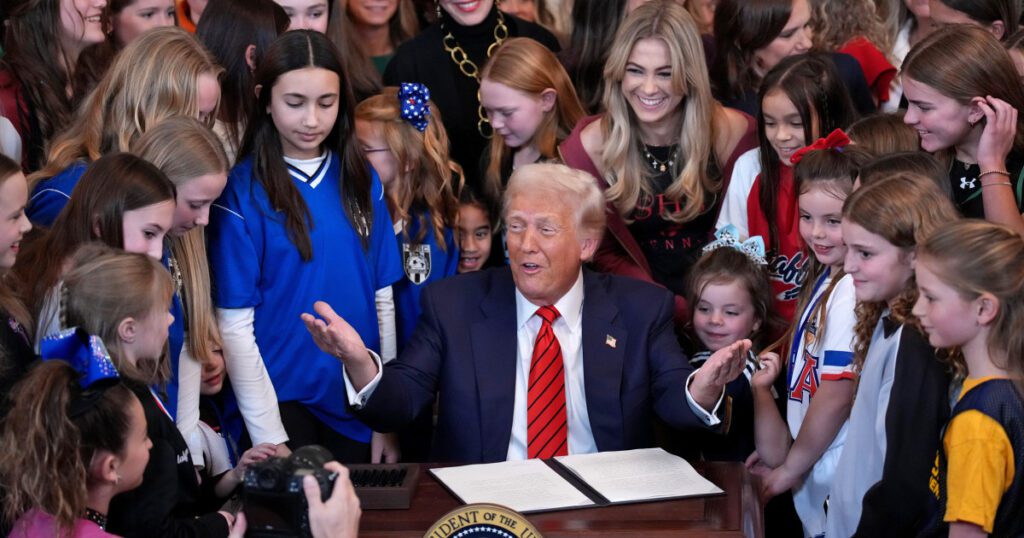New Hampshire’s Fairness in Women’s Sports Act faces scrutiny
Klementowicz criticized New Hampshire’s Fairness in Women’s Sports Act, enacted in July, and former President Trump’s executive order, stating that they “exclude, single out, and discriminate against transgender students.” She emphasized that these measures imply that transgender students do not deserve the same educational opportunities as their peers.
Changes to Title IX Guidelines
During Trump’s first term, the Education Department introduced federal guidelines for implementing Title IX, particularly focusing on sexual misconduct in educational settings. These regulations provided greater protections for students accused of misconduct, including a presumption of innocence throughout the disciplinary process and the right to access all evidence collected against them.
Biden Administration’s Inclusivity
In contrast, the Biden administration developed its own policies, interpreting “sex” in Title IX to include “gender identity,” which enabled the protection of transgender athletes seeking to compete in alignment with their gender identity rather than their sex assigned at birth.
Potential Funding Consequences
Trump signaled intentions to reverse these inclusivity measures upon taking office. His executive order, which prohibits “gender ideology,” clarifies that “sex” refers to “immutable biological classification as either male or female,” excluding the concept of ‘gender identity.’ Schools and colleges that do not comply with this interpretation risk losing federal funding, including educational grants.
Investigations Underway
Although no institution has had its federal funding revoked, the Education Department has initiated investigations into potential civil rights violations related to Trump’s directive. Shortly after the signing of the executive order, inquiries were announced regarding San Jose State University, the University of Pennsylvania, and the Massachusetts Interscholastic Athletic Association.
Specific Cases Under Review
The investigation into San Jose State focuses on the participation of a player on the women’s volleyball team, though the institution has not confirmed the presence of a transgender athlete. At the University of Pennsylvania, the review concerns Lia Thomas, who made history in 2022 as the first trans woman to win an NCAA swimming championship. Thomas, who graduated in 2022, is central to a lawsuit initiated by several athletes last year and another recent suit from three former teammates, targeting the NCAA’s handling of her records.
NCAA’s Response
The NCAA opted not to comment on ongoing legal matters but reiterated its commitment to promoting Title IX, investing in women’s sports, and upholding fair competition across NCAA championships. Following Trump’s executive order, NCAA President Charlie Baker stated that the association would adapt its policy to permit only student-athletes assigned female at birth to compete in collegiate events.
Trans Athlete Landscape
Currently, the number of transgender athletes in college sports remains relatively low. Baker informed congressional officials that fewer than ten transgender athletes compete among the NCAA’s more than 500,000 student-athletes.
Ongoing Investigations and National Debate
Recently, the Education Department announced investigations into two more organizations: the Minnesota State High School League and the California Interscholastic Federation, accusing them of planning to contravene Trump’s executive order.
Craig Trainor, acting assistant secretary for civil rights, reminded these bodies that history typically does not favor entities opposing the enforcement of federal civil rights laws designed to protect women and girls from discrimination.
Reactions from State Organizations
Since 2015, the Minnesota State High School League has permitted transgender student-athletes to compete in accordance with their gender identity and expressed willingness to cooperate with the investigation while seeking further guidance from the state attorney general. Meanwhile, the California Interscholastic Federation opted not to comment on ongoing probes and noted that it does not track data on transgender student-athletes.
Trans Athlete Bans Across the Nation
Prior to Trump’s executive order, over half of U.S. states enacted measures restricting transgender athletes from participating in teams that align with their gender identities, although courts have blocked bans in Arizona, Idaho, Utah, and West Virginia. The national discourse on this issue persists.
Legislation in Indiana
In Indiana, a House education committee recently advanced a bill that would prohibit transgender women from competing on female college sports teams, mirroring a ban already established in K-12 sports in 2022. The committee’s vote included nearly all Democrats, although some expressed concerns over the politicization of supporting both cisgender and transgender female athletes.
Global Impact of U.S. Policy
Trump’s executive order seems to be influencing policies outside of the U.S. One week after its signing, World Athletics, governing body for track and field, recommended placing athletes assigned female at birth with elevated testosterone levels under the same restrictions as those barring transgender athletes in female categories. Furthermore, the International Boxing Association cited Trump’s order to announce plans for legal action against the International Olympic Committee, responding to the participation of boxers who are assigned female at birth and identify as women.
Future Prospects in Olympic Sports
During the signing of his trans sports executive order, Trump was vocal about his intention to challenge transgender participation at the Olympic level. He proposed reviews of policies regarding male athletes looking to compete in women’s sports and urged the IOC to revise regulations pertaining to this “ridiculous subject” ahead of the 2028 Summer Games in Los Angeles.
Trans Athlete Representation in the Olympics
It is significant to note that openly transgender athletes competing in the Olympics remain a rarity.


